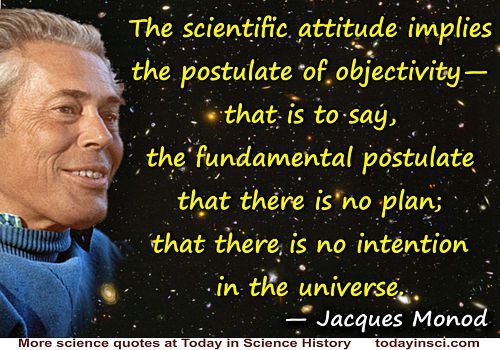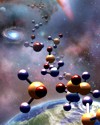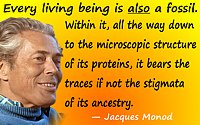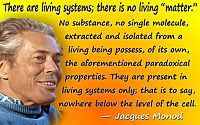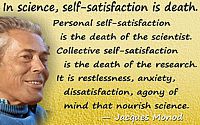 (source)
(source)
|
Jacques Monod
(9 Feb 1910 - 31 May 1976)
French biochemist who shared with his fellow researchers the 1965 Nobel Prize for Physiology or Medicine. They revealed how messenger ribonucleic acid (mRNA) is involved in protein synthesis within a cell. He headed the Pasteur Institute from 1971.
|
Jacques Monod - “There is no intention in the universe”
Illustrated Quote - Medium (500 x 350 px)
More Jacques Monod quotes on science >>
Context of Jacques Monod’s quote, “There is no intention in the universe”
Jacques Monod, having been awarded the 1965 Nobel Prize in Medicine and Physiology, gained more recognition with the smash hit of his book, Le Hazard et La Nécessité (translated as Chance and Necessity). It caught the public's imagination. Reporting in the New York Times (15 Mar 1971), John C. Hess described Monod’s belief “that all forms of life are the product of pure chance—through unpredictable mutation—and of necessity, or Darwinian selection,” which made it impossible “to accept any system, religious or materialist, that assumes a master plan of creation.”
The article quoted Monot's own words from the interview:
“What I have tried to show, is that the scientific attitude implies what I call the postulate of objectivity — that is to say, the fundamental postulate that there is no plan, that there is no intention in the universe.
Now this is basically incompatible with virtually all the religious or metaphysical systems whatever, all of which try to show that there is some sort of harmony between man and the universe and that man is a product—predictable if not indispensable—of the evolution of the universe.
“Of course, naive faiths, fundamentalist beliefs in the Bible do just that. They put man in the center of the universe and believe that for some reason there is a necessity everywhere under God’s command.
In more elaborate modern versions of Christianity you find speculations like those of Teilhard de Chardin, which give an evolutionist interpretation of the universe in which man is a sort of achievement which had been predicted from the beginning. It is again an interpretation which denies the principle of objectivity.”
Monod referred to the late French Jesuit and paleontologist, Pierre Teilhard de Chardin.
The article reported that to date, some 155,000 copies of Monod’s book were already in print, with further translations on the way. Monod was to become the head of the Pasteur Institute the following month.
- Science Quotes by Jacques Monod.
- 9 Feb - short biography, births, deaths and events on date of Monod's birth.
- Jacques Monod - context of quote “Every living being is also a fossil.” - Medium image (500 x 350 px)
- Jacques Monod - context of quote “Every living being is also a fossil.” - Large image (800 x 600 px)
- Jacques Monod - context of quote “There are living systems; there is no living “matter.”” - Medium image (500 x 350 px)
- Jacques Monod - context of quote “There are living systems; there is no living “matter.”” - Large image (800 x 600 px)
- Jacques Monod - context of quote “There is no intention in the universe” - Large image (800 x 600 px)
- Jacques Monod - context of quote “In science, self-satisfaction is death.” - Medium image (500 x 350 px)
- Jacques Monod - context of quote “In science, self-satisfaction is death.” - Large image (800 x 600 px)
- Origins of Molecular Biology: A Tribute to Jacques Monod, by Agnes Ullmann (ed.). - book suggestion.
